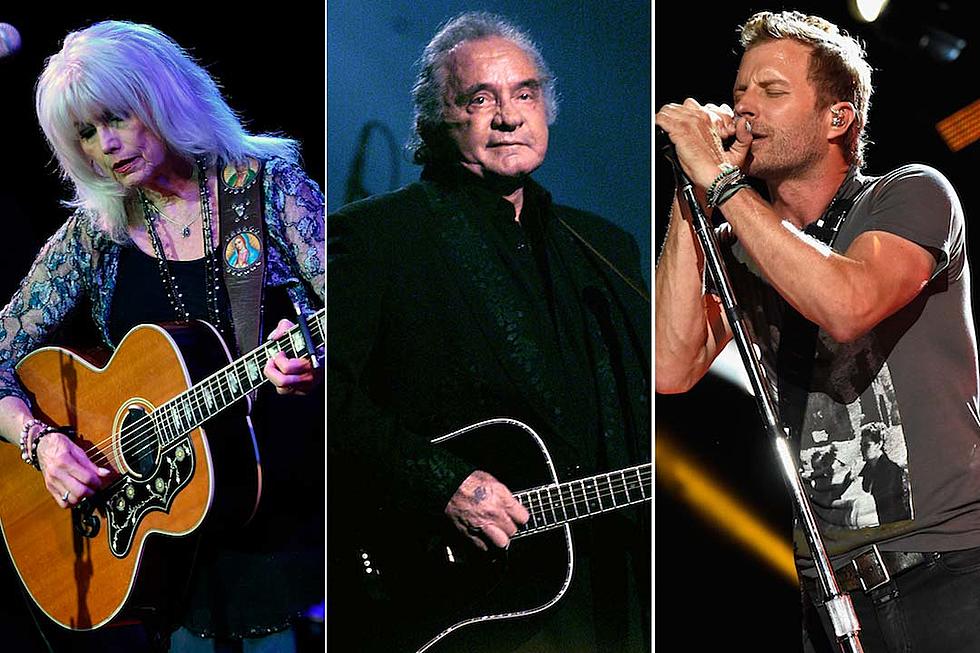
Kacey Musgraves: Can Nashville’s Grammy Darling Conquer Country Radio?
Kacey Musgraves is arguably country music's most talked-about breakout performer right now. 2013 was a year of dizzying attention for Musgraves, whose major label debut album, 'Same Trailer Different Park,' made 2013 year-end critics' lists everywhere, culminating in 2013 Grammy wins for Best Country Album and Best Country Song.
But despite her well-deserved critical accolades, Musgraves has yet to score consistent success at country radio. Her first single, 'Merry Go 'Round,' proved her biggest hit so far, reaching No. 14 and helping her album debut at No. 1 in the country charts. But two subsequent singles have stalled outside the Top 20, and despite an enormous year in terms of awards, reviews and touring, it remains to be seen if Musgraves' challenging, against-the-grain approach can spell similar success in the commercial marketplace.
That underscores one of the hard truths about radio -- namely, that it doesn't necessarily exist to bring the best music to the masses.
Her second single, 'Blowin' Smoke,' centered around a group of trash-talking waitresses on a smoke break from the diner where they're essentially trapped in dead-end jobs, in the small town where they're trapped in dead-end lives. It stalled at No. 31 on Billboard's Hot Country Songs chart, reaching No. 23 on the US Country Airplay chart.
For her third single, Musgraves chose 'Follow Your Arrow,' which is arguably the centerpiece of her album. It's also a song that is about as far away from the material that currently dominates country radio as any one song could possibly get, offering up some of the most challenging lyrics to come out of Nashville in many years.
"Make lots of noise, kiss lots of boys / Or kiss lots of girls if that's something you're into / When the straight and narrow gets a little too straight, roll up a joint, or don't," Musgraves sings, in a celebration of personal identity. And while the choice to release it as a single was a daringly brave one, it could also be viewed as foolish in the current radio climate. 'Follow Your Arrow' peaked at No. 26 in the Hot Country Songs chart, and stalled out at No. 43 in the Country Airplay chart.
That should really come as no surprise. When Musgraves debuted the song to an industry-only audience at last year's Country Radio Seminar, the assembled radio tastemakers instantly recognized its unique appeal, breaking into applause at different impact points throughout the lyric. But while Musgraves' performance dominated much of the conversation at subsequent CRS functions, the overwhelming consensus of the radio people was that although they loved the song, they would be unlikely to play it on any of their stations if it was released as a single.
That underscores one of the hard truths about radio -- namely, that it doesn't necessarily exist to bring the best music to the masses. Rather, it exists to present the kind of music to people that programmers believe they will be most likely to like.
Sometimes that can mean a universal song like Tim McGraw's 'Live Like You Were Dying' gets huge airplay, but it can also often mean offering listeners more of the same thing they've already demonstrated a willingness to consume -- which is why we see such obvious trends, like truck songs, that dominate radio for a period of time. Oftentimes a more challenging song can very actively engage a portion of the audience while turning off another segment, and that's ultimately not good for ratings. That means a song like 'Follow Your Arrow' might enjoy wide support in certain markets, while never receiving a single spin in another area of the country.
That's a fact that songwriter Brandy Clark is well aware of. Clark is one of Nashville's top writers, with hits including Miranda Lambert's 'Mama's Broken Heart' and the Band Perry's 'Better Dig Two.' Her recent solo album, '12 Stories,' was one of the most critically acclaimed releases of the past year, but she's mostly had to pursue alternative marketing avenues like NPR and satellite radio, as opposed to taking a run at commercial radio.
Record labels aren't in business to move the needle. They're in business to exploit recorded matter for profit, regardless of its content.
Clark is also one of the writers on 'Follow Your Arrow,' and she was philosophical about the song's chances at radio. "Well, you know, with great risk comes great reward," she told The Boot in October. "I mean, I’m thrilled, of course; I’m a writer on that song, so for selfish reasons I’m thrilled. But then I’m just thrilled that her label and her would take a chance like that. And I think no matter what, that’s a win. I think people love that song, and I’m sure there will be a lot of stations that won’t play it, but there will also be stations that will, and it moves the needle."
That's true -- but it's also true that record labels aren't in business to move the needle. They're in business to exploit recorded matter for profit, regardless of its content, and if they can sell more units on a relatively bland, cookie-cutter artist whose single is reminiscent of every other artist in the marketplace at the moment than they can on a more challenging artist, for the most part they will -- and why shouldn't they? It isn't their job to decide what's good and bad. It's their job to meet the quarterly profit projections of their parent companies.
That leaves an artist like Musgraves in somewhat of a strange place moving forward. She's won an armload of awards, performed on huge tours and become one of the most respected artists in country music in a short period of time, but even after a post-Grammys sales bump, 'Same Trailer Different Park' has moved right around 315, 000 units -- certainly not a sales disaster, given the massive overall decline in sales over the last few years, but still only a fraction of the genre's sales leaders.
Musgraves was recently announced as one of the special guests on pop queen Katy Perry's upcoming tour, which could be taken two ways. It could be an opportunity for fans who wouldn't normally be exposed to country music to be introduced to one of the genre's most up-and-coming performers, or it could be a marketing experiment to see if Musgraves plays more easily to an audience outside of country's parameters. If we see her succeed in that arena, we could also see her start to make records that are pitched more toward that audience, and less toward country.
It's a common lament in country music that we're currently lacking artists of greater substance. It's also simply not true. There's every bit as much great music coming out of Nashville as there ever has been. The fact that you might have to seek it out is a function of commerce, and is in no way indicative of what either the artists or the fans really want.
For the overall good of the genre, it's important to keep an artist as strong and unique as Kacey Musgraves in country music. Here's hoping that the powers that be in the business recognize and support that outcome, because if Musgraves ultimately doesn't bring the business the kind of financial rewards that match her critical success, it could ultimately send labels -- and radio -- the message that fans don't want more challenging fare, and supporting it is not good business.
And with the country genre already in the midst of such an identity crisis, that's the last thing we need.
More From TheBoot









